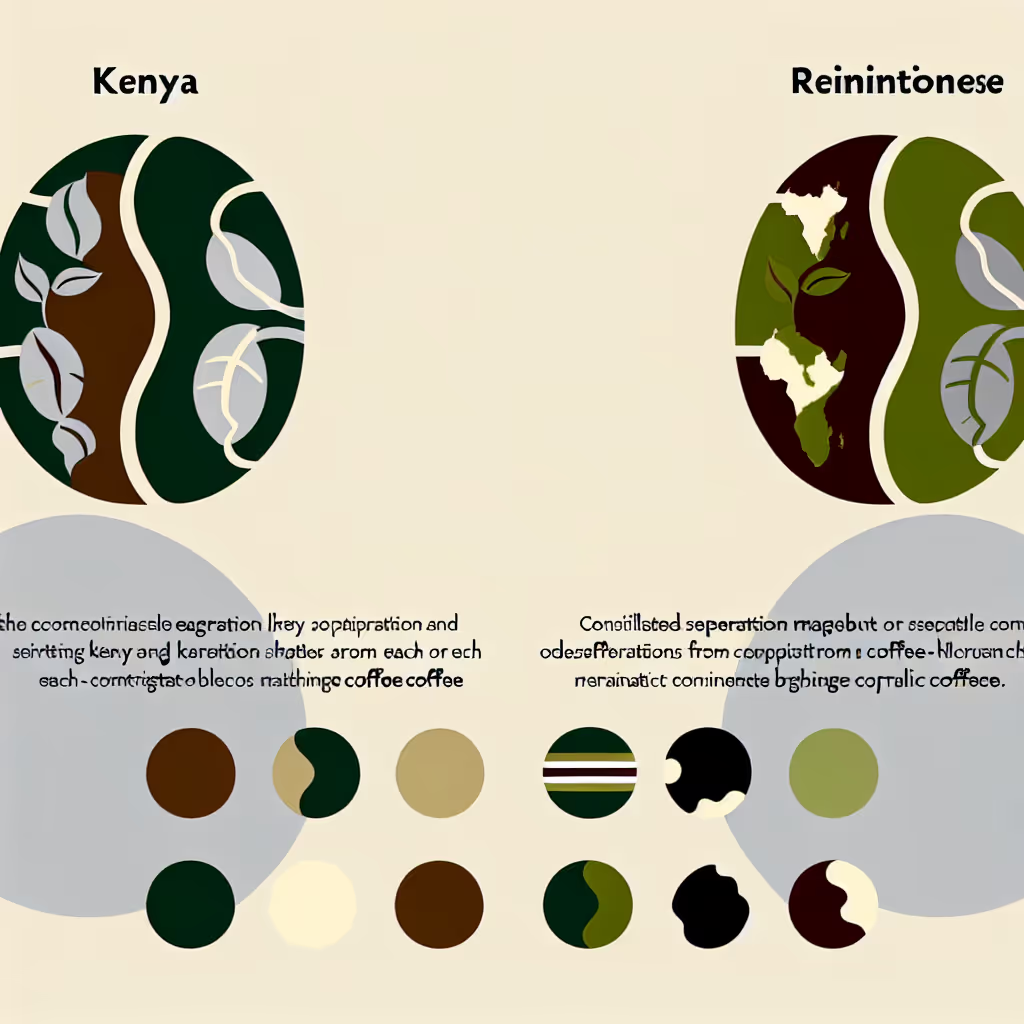Kenyan Vs. Venezuelan Coffee
This comparison explores the unique qualities of Kenyan and Venezuelan coffee beans, highlighting their distinct flavor profiles, growing conditions, and brewing methods to help coffee enthusiasts make informed choices.

Brief Description
Kenyan coffee is renowned for its bright acidity, full body, and complex flavor profile. Grown in the rich volcanic soils of the Central Highlands, these beans benefit from ideal climate conditions and meticulous processing. The result is a cup that's bold, wine-like, and often described as the 'connoisseur's choice'. With notes ranging from blackcurrant to citrus, Kenyan coffee offers a truly unique and memorable tasting experience.
Venezuelan coffee is renowned for its rich, full-bodied flavor and subtle complexity. Grown in the picturesque Andes Mountains, these beans benefit from ideal altitude, climate, and soil conditions. The result is a cup that balances sweetness with a gentle acidity, offering notes of chocolate, nuts, and caramel. Despite facing economic challenges, Venezuelan coffee continues to be prized by connoisseurs for its unique character and smooth finish.
Importance of Comparison
Comparing Kenyan and Venezuelan coffee is crucial for coffee lovers seeking to expand their palate and understand the nuances of single-origin beans. These two origins offer distinct flavor profiles and represent different coffee-growing regions, providing insight into how geography and processing methods influence taste. By exploring these differences, consumers can make more informed purchasing decisions and enhance their coffee experience.
Key Attributes
Origin
Kenyan
Venezuelan


Consumer Guide
When choosing between Kenyan and Venezuelan coffee, consider your flavor preferences. If you enjoy bright, wine-like acidity with complex fruit notes, Kenyan coffee might be your ideal choice. Look for beans labeled 'AA' or 'AB' for the highest quality. For those who prefer a smoother, more balanced cup with chocolate and nutty undertones, Venezuelan coffee could be the perfect fit. Consider the brewing method as well; Kenyan coffee shines in pour-over and cold brew preparations, while Venezuelan beans excel in espresso and French press. Experiment with different roast levels to find your sweet spot, but remember that lighter roasts often showcase the unique characteristics of each origin best.
Expert Opinions
Coffee expert Maria Rodriguez notes, 'Kenyan coffee is often described as the 'connoisseur's choice' due to its vibrant acidity and complex flavor profile. Venezuelan coffee, on the other hand, offers a more approachable cup with its balanced sweetness and gentle acidity.' Roastmaster John Smith adds, 'The terroir of Kenya's Central Highlands imparts a distinctive blackcurrant note to the beans, while Venezuela's Andes Mountains contribute to the coffee's rich, chocolatey character. Both are excellent examples of how geography influences flavor.'
FAQs
Kenyan coffee is known for its bright acidity, full body, and complex flavor profile with notes of blackcurrant, citrus, and floral undertones. Venezuelan coffee, in contrast, offers a rich, full-bodied flavor with a more subtle complexity, featuring notes of chocolate, nuts, and caramel. Kenyan coffee tends to be more vibrant and wine-like, while Venezuelan coffee is smoother with a gentler acidity.
Kenyan coffee is typically grown at higher altitudes, ranging from 1400 to 2100 meters, in the volcanic soils of the Central Highlands. This contributes to its unique flavor profile. Venezuelan coffee is grown in the Andes Mountains at altitudes between 800 and 2000 meters. Both regions benefit from ideal climate conditions, but the specific terroir of each country imparts distinct characteristics to the beans.
For Kenyan coffee, pour-over, French press, and cold brew methods are excellent choices to highlight its bright acidity and complex flavors. Venezuelan coffee shines in espresso, French press, and pour-over preparations, which bring out its rich, full-bodied character and subtle notes. Experiment with different methods to find your preferred way of enjoying each origin.
Kenyan coffee is typically processed using the washed method, often with a double fermentation process, and then sun-dried. This contributes to its clean, bright flavor profile. Venezuelan coffee is processed using various methods, including washed, natural, and honey processing. This diversity in processing allows for a range of flavor profiles within Venezuelan coffee.
Both Kenyan and Venezuelan coffees are often considered specialty coffees due to their unique flavor profiles and growing conditions. Kenyan coffee, in particular, is highly regarded in the specialty coffee world for its distinctive characteristics. Venezuelan coffee, while facing some economic challenges, is still prized by connoisseurs for its smooth, balanced flavor profile.
Interestingly, both Kenya and Venezuela have similar annual coffee production levels, each producing around 50,000 metric tons per year. However, it's worth noting that production levels can fluctuate due to various factors such as climate conditions, economic situations, and agricultural practices in each country.
Conclusion
Both Kenyan and Venezuelan coffees offer unique and rewarding experiences for coffee enthusiasts. Kenyan coffee stands out with its bright acidity, complex flavor profile, and wine-like qualities, making it a favorite among connoisseurs. Venezuelan coffee, with its rich, full-bodied flavor and subtle complexity, provides a smoother, more approachable cup. Your choice between the two may depend on your personal taste preferences, brewing methods, and desire for adventure in your coffee journey. Whichever you choose, both origins promise a delightful exploration of the diverse world of single-origin coffees.






